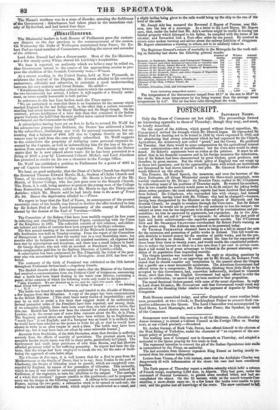POSTSCRIPT.
SATURDAY NIGHT,
Only the House of Commons sat last night. The proceedings formed an interesting appendix to those of Thursday; though they may, and must, be briefly described.
On the report of the Address, which passed without formal opposition, Mr. COLQUHOUN revived the wrangle which Mr. Disraeli began. He reproached Sir Robert Peel for desiring not to be bound in 1846 by views expressed in 1842, and for abandoning that strong attachment which be had expressed for the Church, Agriculture, the Aristocracy now called "proud," and the Crown. He predicted for Tuesday, that there would be some compensation for the agricultural interest —some commutation—lots of mystification; but the Corn-laws would be aban- doned. Sir Robert's arguments were as rotten as the potatoes. It must be ad- mited that in his financial measures and in his foreign measures the Administra- tion of Sir Robert had been characterized by great wisdom, great prudence, and therefore, by great success. But the whole policy of England was not wrapt tqa in those two questions; and for the approaching storm with which our institution& are threatened he had shown himself a bad pilot. Mr. GEORGE BANK:es after- wards followed up this attack.
The Premier, the Royal Speech, the measures, and even the increase of the Navy Estimates, _all things Ministerial except the Slave-trade paragraph, were warmly vindicated by Mr. Enna ! Sir ROBERT PEEL replied to Mr. Colquhoom by reiterating many of his positions of Thursday night. He warned his assailant, that in two months the scarcity would prove to be no fit subject for joking levity about rotten potatoes: the most alarming reports had been received that morning from Ireland. Mr. Colquhoun, who reproached him with change, had himself changed sides having voted with Mr. Villiers: why had he changed ?—because, having been disappointed by the Minister on the subjects of Maynooth and the Scottish Church, he sought to retaliate through the Corn-laws. But Sir Robert declared that he would not be provoked by any acrimony to lose his temper: the subject at issue was far too important to be disposed of by recriminations and per- sonalities: let him be answered by arguments, not reproaches. As to the Aris- tocracy, he did not call it " proud " in reproach: he alluded to the just pride of high and heroic achievements—the superbia guccsita meritis. The O'Convort Dow and Mr. Suaamaai CRAWFORD corroborated Sir Robert Peel's warning as to the potato crop. The Address was ordered to be presented today.
Sir Taomes FREMANTLE obtained leave to bring in a bill to amend the sets
for the extension and promotion of public works in Ireland. This bill would en- able districts to borrow money for the erection of public works, and for the pro- motion of fisheries in Ireland. It would extend the time for the repayment of these loans from three to twenty years, and would enable the constituted authori- ties to reduce the interest on them to a less rate than 5 per cent in certain cases. Such a bill would be of great advantage to Ireland in the present alarming con- dition of its population from impending scarcity. The Oregon question was touched upon. In reply to objecting questions by
Lord Jolla Russet', and to an approving one by Mr.HIINE, Sir ROBERT PEEL stated that he should consider any termination to the quarrel about the Oregon but s pacific one a most lamentable misfortune. The American Government had offered terms for a compromise; Mr. Pakenham, thinking them little likely to be accepted by this Government, had, somewhat indiscreetly, declined to transmit them; since that time, the English Government had again offered to refer the matter to arbitration; no answer had yet been received to that proposition.
The usual Sessional Orders passed, with some of the usual objections. In reply to Lord JOHN Russian, Mr. Gounatam said that Government would resist any alteration of the Standing Order relative to the payment of deposits by Railway Companies.


























 Previous page
Previous page